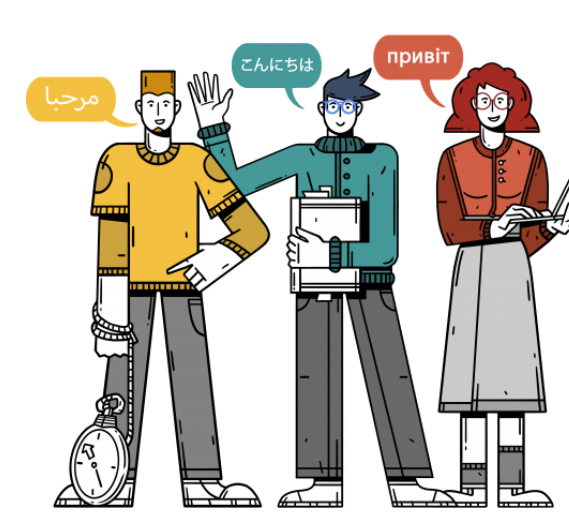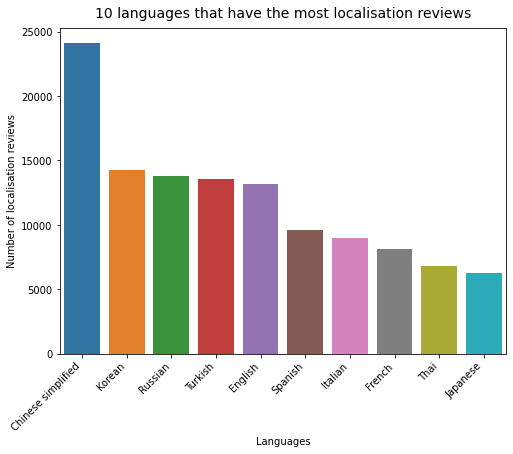game localization

The Importance of Game Localization
Localizing games requires a deep understanding of the cultural sensitivities of each locale. This may include adapting content to reflect idiomatic expressions and slang or even changing the way characters interact with each other.
Planning for game localization during development can save developers time and effort. A robust localization CMS can enable translators to edit and update strings without disturbing the code, making it easy for QA to test for changes.
Introducing New Markets
With global gaming revenues projected to reach $282bn by 2024, it is more important than ever for video game publishers to think of a wide international audience. Localizing a video game for different regions is the best way to broaden its potential customer base. This includes translating not only in-game content, but also screenshots and sales pages.
The top 10 languages with the most translation reviews are shown in the graph above. They are simplified Chinese, Korean, Russian, Turkish, English, Spanish, Italian, French, Thai, and Japanese. By looking at the text data, we can see how often users ask for localized versions of games or suggestions for making the localized versions that are already out there better. This kind of knowledge helps game localization companies figure out which languages they should focus on in their long-term plans for growth.
Heres a list of the most trending langugages for games:

When a game is not properly localized, gamers from a different region might see it as an insult to their culture. This can result in a negative perception of the game itself, a loss of revenue, and damage to the gaming company’s reputation.
It is best to think of game localization at the start of the development process. This allows for the translation team to incorporate cultural references into the game’s design and development, making it more relevant to players from a different country or culture.
This can include adapting salutations, currencies, date and time formats, and the careful use of colloquial language. It can also involve incorporating different character encoding schemes to ensure that in-game text renders correctly across a variety of platforms and devices.
In addition, the game localization process can help to avoid stereotypes and offensive content that might offend gamers from a particular region. This is particularly important for games that have a storyline or narrative. For example, if a game has a young female protagonist who is perceived as a child in the Western market, it might not be well received in Asian markets. On the other hand, a young boy character might work well in a Japanese market.
While the benefits of video game localization are clear, it can be difficult to do well. The process is complex, and requires a large number of different tools and manual actions. This can cause data fragmentation and errors. For this reason, it is recommended that a game localization project be split into manageable chunks by language and type of content. This will allow for more effective workflow and a higher quality of translation. It will also make it easier for developers to review and verify the finished product.
Boosting Revenue
Video game players can be divided into two camps: those who play for the graphics and those who play for the story. Localization is essential to capturing the latter group of gamers. It helps ensure that the game’s dialogue, characters, and storyline resonate with local players. It also helps avoid any cultural mishaps that could damage the developer’s reputation and prevent the game from reaching its full potential in a new market.
The gaming industry is growing quickly, and tapping into international markets will help you grow your player base and revenue. However, localization isn’t as simple as translating the game’s text into a different language. It involves adapting the entire game experience to fit local culture and customs, and that can be a significant undertaking. A game localization company with a good track record can help you create a gaming experience that appeals to global players while maintaining the integrity of the original work.
Moreover, localizing a video game can help you avoid piracy and ROM hacking, which are major threats to the gaming industry. By creating official versions of the game for foreign markets, you can protect your intellectual property and maximize revenue. Additionally, creating a localized version of the game will help you attract a more diverse audience and build brand loyalty.
It’s important to consider the effects of localization on your gaming business before deciding whether it is worth the investment. But if you make the right choices, you can unlock a world of opportunities and boost your game’s sales worldwide.
Localization isn’t just about translation—it’s about tailoring the game to a specific audience and making sure that it feels like it was designed specifically for them. This will increase player engagement and retention rates, and it will help you attract more customers and boost your revenues. If you’re ready to take your game to the next level, contact a game localization company today. They can help you get started on your journey to a world of international success! They can also assist you with marketing and promoting your games to new audiences.
Increasing Customer Satisfaction
Game localization makes video games more appealing to local players, boosting customer satisfaction. The process includes adapting every aspect of the game to fit the culture and gaming norms of the target market. This includes the game’s story, gameplay mechanics, graphics, and characters. It also ensures that the game complies with local laws and regulations regarding content, privacy, and data handling.
Gamers are extremely discerning when it comes to the way they perceive and interact with a game. They’re often critical of small changes that affect the way a character or a story is presented, such as changing a voice actor’s tone of voice. This is why it’s important for a video game to be localized before release. It helps ensure that all users are able to enjoy the game without being distracted by irrelevant or culturally insensitive elements.
Localizing a video game is an intricate process that requires the expertise of skilled translators and developers to ensure it’s successful. This is why savvy game studios employ professional translation services and use robust localization management software to achieve high-quality and consistent localized gaming experiences.
Game localization is also an effective way to introduce video games into new markets. This can help grow the user base for a game, which in turn increases its potential revenue stream. Additionally, it can prevent piracy and ROM hacking, which is a major concern for video game developers.
Gaming is becoming increasingly popular across the globe. The global market is predicted to reach $56 billion by 2021. With this in mind, it’s vital that the gaming industry continues to evolve and develop new games for a diverse audience. Localizing video games is a great way to do this, as it allows companies to cater to different cultures and expand their user base. Additionally, it can increase revenue and help improve the reputation of the gaming company. Whether you’re a developer or an avid gamer, localization is key to having a great gaming experience. So, make sure to take advantage of this exciting technology and start playing your favorite video games in your native language!
Boosting Sales
As video games become more accessible with the rise of mobile devices and high-speed Internet, video game companies are turning to localization to expand their global reach and boost sales. Game localization is the process of adapting a video game to fit the cultural preferences of different audiences. This includes adjusting visuals, gameplay mechanics, and dialogue to ensure that the game resonates with its target audience. This can make a huge difference in the success of a video game, as players will be more likely to buy it if they feel that it is tailored to their needs and interests.
Localization is important for many industries, but it is especially crucial for gaming companies. A game that is not localized can be subject to piracy or ROM hacking, which can have serious consequences for the company and its brand image. Localized video games also offer a better user experience, which can lead to higher customer satisfaction and increased revenue. Therefore, incorporating localization into a video game’s development can help reduce costs by avoiding the need to rework code for each new market.
When a video game is properly localized, it can be a hit in any market, as it will be tailored to the specific cultural preferences of the target audience. This will increase the game’s appeal, making it more appealing to potential customers and boosting its sales. In addition, video game companies can use localized content to promote their products, which will result in more leads and sales.
Localized video games can also have a positive impact on player retention rates. A recent study found that video gamers are more likely to repurchase a game if it is available in their native language. This is because they can more fully immerse themselves in the game and are less likely to be distracted by unfamiliar cultural references or clumsy translations.
In addition, video game localization can help to boost a game’s visibility on Steam.






